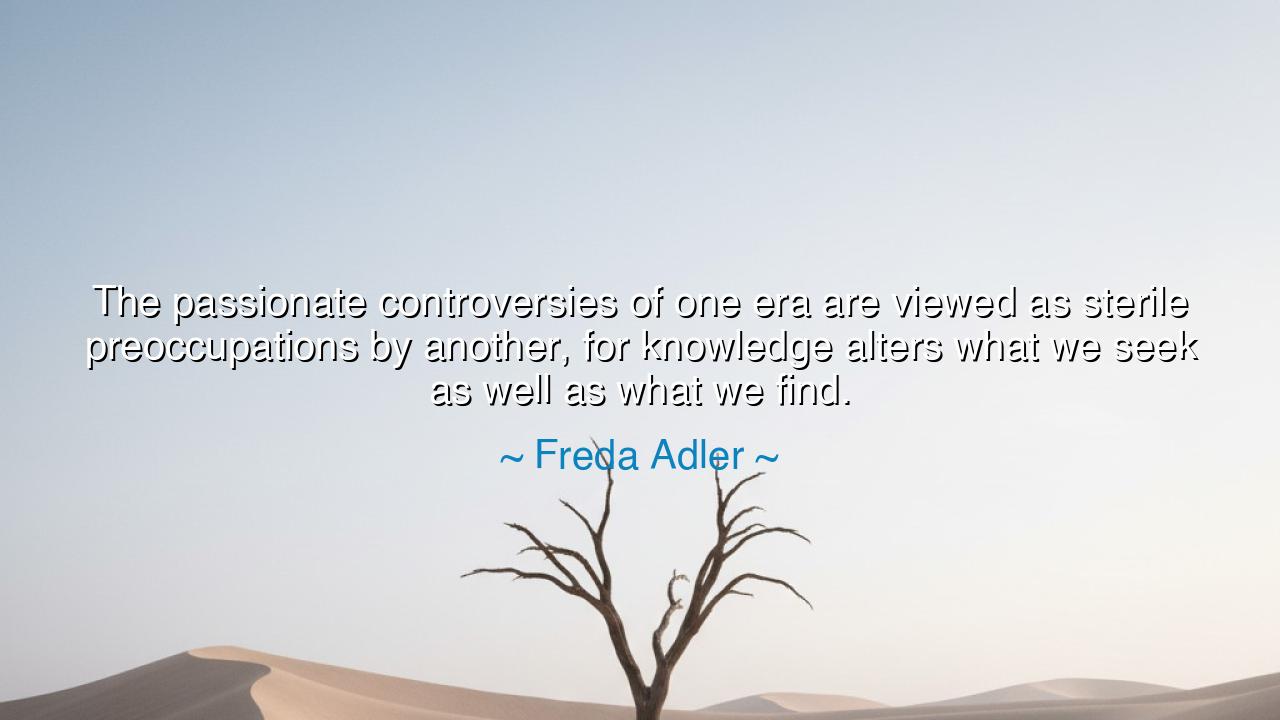
The passionate controversies of one era are viewed as sterile
The passionate controversies of one era are viewed as sterile preoccupations by another, for knowledge alters what we seek as well as what we find.






“The passionate controversies of one era are viewed as sterile preoccupations by another, for knowledge alters what we seek as well as what we find.” Thus spoke Freda Adler, a scholar of justice and human behavior, whose insight pierces through the illusions of time itself. In these words lies a deep meditation on the shifting nature of truth, the evolution of human understanding, and the humbling realization that what seems vital and world-shaping in one age may, in another, appear trivial or misguided. She reminds us that knowledge is not a static monument but a living river, and as it flows, it reshapes the very landscapes through which it runs.
Adler’s reflection is not a condemnation of the past, but a revelation of its transience. Every age believes it stands at the summit of wisdom. Every generation clings fiercely to its controversies, its debates, its convictions — convinced that the world turns upon their resolution. And yet, as centuries pass, the fervor cools, and what was once seen as the great question becomes a curiosity, a footnote in the long scroll of history. The passions of yesterday become the dust of today, not because they lacked sincerity, but because knowledge transforms perspective. We see differently not because we disdain the past, but because we now stand on higher ground built by the very minds that came before us.
Consider the fierce arguments of the medieval scholars who once debated how many angels could dance upon the head of a pin — a question that, to them, was no idle fancy, but an inquiry into the nature of existence and spirit. To modern eyes, such disputes seem absurd, the sterile preoccupations Adler describes. Yet those same thinkers, through their meticulous reasoning and devotion to truth, laid the foundations of the scientific method that would one day illuminate the cosmos. Thus, what seems foolish in hindsight was once the seed of revelation. In this way, Adler calls us to humility: to understand that our own “passionate controversies” may one day appear as narrow and quaint to those who follow.
The advancement of knowledge, she teaches, alters both what we seek and what we find. For as our understanding grows, our questions change. The ancient alchemists sought gold, but in their failures, they discovered chemistry. The astronomers who charted the heavens to prove divine order uncovered instead the vast laws of physics. What they found was not what they sought, yet it was greater. Each generation inherits both the triumphs and the blind spots of the last, and in learning more, we realize how much we still do not know. Knowledge humbles even as it enlightens.
In her words, there is also a quiet warning: that the certainty of our convictions must be tempered by the awareness of their impermanence. For if history teaches anything, it is that human pride often mistakes partial truth for absolute truth. Those who burned others for heresy believed themselves righteous; those who dismissed new ideas as madness could not see the dawn breaking behind them. Adler’s wisdom invites us to remain seekers, not zealots — to recognize that the expansion of knowledge will forever reveal the limits of our current understanding.
And yet, her message is not one of despair, but of reverence for progress. Each age, in its striving, contributes to the grand ascent of human thought. Though our passions may fade, their fire propels the next generation higher. The debates of philosophers, the errors of scientists, the faith of reformers — all are steps upon the staircase of enlightenment. We must not mock the ignorance of the past, for our own knowledge too will one day seem primitive to those yet unborn. The glory of the human spirit lies not in possessing all truth, but in its relentless pursuit of it.
Therefore, let this be the lesson: hold your convictions boldly, but hold them lightly. Engage in the controversies of your time with passion, but with the wisdom to know that they too will pass. Cherish knowledge, for it is the flame that lights the way forward, but never forget that every flame casts a shadow. Seek not only to prove yourself right, but to understand — and to grow beyond understanding. For as Adler reminds us, each discovery changes not only what we know, but who we are. And so, with each generation, humanity becomes both humbler and wiser — ever reaching, ever learning, ever awakening to the vast and mysterious beauty of truth.
In this, Freda Adler’s words stand as a beacon for all thinkers and dreamers: that our task is not to cling to the passions of our era, but to contribute faithfully to the long conversation of history — knowing that, one day, even our fiercest debates will fade into silence, but the wisdom born of them will endure.






AAdministratorAdministrator
Welcome, honored guests. Please leave a comment, we will respond soon